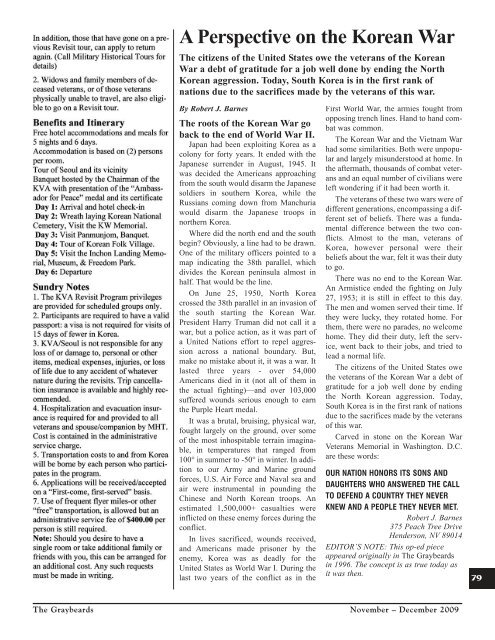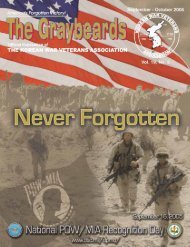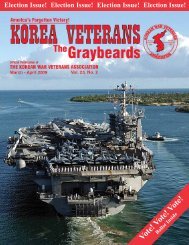gray06 Nov-Dec 2009_Gray01_Jan-Feb 2005.qxd.qxd - Korean War ...
gray06 Nov-Dec 2009_Gray01_Jan-Feb 2005.qxd.qxd - Korean War ...
gray06 Nov-Dec 2009_Gray01_Jan-Feb 2005.qxd.qxd - Korean War ...
You also want an ePaper? Increase the reach of your titles
YUMPU automatically turns print PDFs into web optimized ePapers that Google loves.
A Perspective on the <strong>Korean</strong> <strong>War</strong><br />
The citizens of the United States owe the veterans of the <strong>Korean</strong><br />
<strong>War</strong> a debt of gratitude for a job well done by ending the North<br />
<strong>Korean</strong> aggres sion. Today, South Korea is in the first rank of<br />
nations due to the sacrifices made by the veterans of this war.<br />
By Robert J. Barnes<br />
The roots of the <strong>Korean</strong> <strong>War</strong> go<br />
back to the end of World <strong>War</strong> II.<br />
Japan had been exploiting Korea as a<br />
colony for forty years. It ended with the<br />
Japanese surrender in August, 1945. It<br />
was decided the Americans approaching<br />
from the south would disarm the Japa nese<br />
soldiers in southern Korea, while the<br />
Russians coming down from Manchuria<br />
would disarm the Japanese troops in<br />
northern Korea.<br />
Where did the north end and the south<br />
begin? Obviously, a line had to be drawn.<br />
One of the military officers pointed to a<br />
map indicating the 38th parallel, which<br />
divides the <strong>Korean</strong> peninsula almost in<br />
half. That would be the line.<br />
On June 25, 1950, North Korea<br />
crossed the 38th parallel in an invasion of<br />
the south starting the <strong>Korean</strong> <strong>War</strong>.<br />
President Harry Truman did not call it a<br />
war, but a police action, as it was part of<br />
a United Nations effort to repel aggression<br />
across a national bound ary. But,<br />
make no mistake about it, it was a war. It<br />
lasted three years - over 54,000<br />
Americans died in it (not all of them in<br />
the actual fighting)—and over 103,000<br />
suffered wounds serious enough to earn<br />
the Purple Heart medal.<br />
It was a brutal, bruising, physical war,<br />
fought largely on the ground, over some<br />
of the most inhospitable terrain imaginable,<br />
in temperatures that ranged from<br />
100° in summer to -50° in winter. In addition<br />
to our Army and Marine ground<br />
forces, U.S. Air Force and Naval sea and<br />
air were instrumental in pounding the<br />
Chinese and North <strong>Korean</strong> troops. An<br />
estimated 1,500,000+ casualties were<br />
inflicted on these enemy forces during the<br />
conflict.<br />
In lives sacrificed, wounds received,<br />
and Americans made pris oner by the<br />
enemy, Korea was as deadly for the<br />
United States as World <strong>War</strong> I. During the<br />
last two years of the conflict as in the<br />
First World <strong>War</strong>, the armies fought from<br />
opposing trench lines. Hand to hand combat<br />
was common.<br />
The <strong>Korean</strong> <strong>War</strong> and the Vietnam <strong>War</strong><br />
had some similarities. Both were unpopular<br />
and largely misunderstood at home. In<br />
the aftermath, thousands of combat veterans<br />
and an equal number of civilians were<br />
left wondering if it had been worth it.<br />
The veterans of these two wars were of<br />
different generations, encompassing a different<br />
set of beliefs. There was a fundamental<br />
difference between the two conflicts.<br />
Almost to the man, veterans of<br />
Korea, however personal were their<br />
beliefs about the war, felt it was their duty<br />
to go.<br />
There was no end to the <strong>Korean</strong> <strong>War</strong>.<br />
An Armistice ended the fighting on July<br />
27, 1953; it is still in effect to this day.<br />
The men and women served their time. If<br />
they were lucky, they rotated home. For<br />
them, there were no parades, no welcome<br />
home. They did their duty, left the service,<br />
went back to their jobs, and tried to<br />
lead a normal life.<br />
The citizens of the United States owe<br />
the veterans of the <strong>Korean</strong> <strong>War</strong> a debt of<br />
gratitude for a job well done by ending<br />
the North <strong>Korean</strong> aggres sion. Today,<br />
South Korea is in the first rank of nations<br />
due to the sacrifices made by the veterans<br />
of this war.<br />
Carved in stone on the <strong>Korean</strong> <strong>War</strong><br />
Veterans Memorial in Washington. D.C.<br />
are these words:<br />
OUR NATION HONORS ITS SONS AND<br />
DAUGHTERS WHO ANSWERED THE CALL<br />
TO DEFEND A COUNTRY THEY NEVER<br />
KNEW AND A PEOPLE THEY NEVER MET.<br />
Robert J. Barnes<br />
375 Peach Tree Drive<br />
Henderson, NV 89014<br />
EDITOR’S NOTE: This op-ed piece<br />
appeared originally in The Graybeards<br />
in 1996. The concept is as true today as<br />
it was then.<br />
79<br />
The Graybeards<br />
<strong>Nov</strong>ember – <strong>Dec</strong>ember <strong>2009</strong>

















